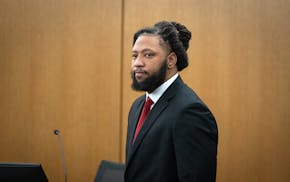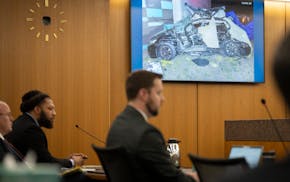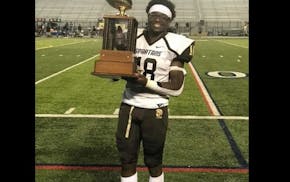Minnesota First Lady Gwen Walz is speaking for the first time about the couple's yearslong struggle with infertility and clarifying that they used a common treatment called intrauterine insemination to start their family — not in-vitro fertilization (IVF), which has become a national flashpoint in the debate over reproductive rights.
"Our fertility journey was an incredibly personal and difficult experience," she said in a statement. "Like so many who have experienced these challenges, we kept it largely to ourselves at the time – not even sharing the details with our wonderful and close family."
The family decided to start sharing their struggles with infertility earlier this year after the Alabama Supreme Court ruled that embryos created through IVF should be considered children. Several IVF clinics in Alabama immediately suspended treatments in response to the ruling, and Gov. Tim Walz started to talk about the couple's struggles to conceive their daughter Hope in speeches and conversations with the press. Walz's governor campaign put out a fundraising blast saying they used "I.V.F. to start a family.''
Walz has continued to talk about their experience on the national stage as he campaigns as the vice presidential nominee alongside Kamala Harris. In his debut as her running mate, he told a crowd in Philadelphia that the issue of IVF treatments is "personal for me and my family."
Many news outlets, including the Star Tribune, have reported the family relied on IVF to conceive. National infertility group Resolve said in a statement Monday that they regretted if their organization "contributed to any confusion about how he became a parent."
"This deeply personal information was only recently clarified," the organization said in a release, adding that the conversations the family has sparked around fertility treatments have still made "millions of would-be parents across the country feel seen."
Walz's political opponents are accusing him of intentionally misleading the public about the issue, which is the center of a heated debate nationally over reproductive rights. Republican vice presidential nominee JD Vance posted a recent video on X where Walz said "my kids were born" through IVF and said the governor "lied" about the procedure. "Who lies about something like that?"
In statements, the Harris campaign has said the Walzes "had their daughter, Hope, through reproductive health care like IVF." Mia Ehrenberg, a Harris-Walz campaign spokesperson, said the governor's previous comments about IVF reflect that the governor "talks how normal people talk. He was using commonly understood shorthand for fertility treatments."
Around one in six couples experience infertility, or difficulty conceiving after a year of unprotected sex, according to the World Health Organization. Some choose to seek treatment, which can range from medications to procedures that are costly but can increase a couple's chances of getting pregnant.
Intrauterine insemination, or IUI, is a less invasive fertility procedure that involves placing sperm directly into a woman's uterus to increase the chances of fertilization. Unlike IVF, the IUI procedure doesn't involve frozen embryos, which the Alabama high court ruled should be considered children. Fertility clinics in Alabama feared they could be sued if embryos were destroyed.
The Walzes struggled for seven years to conceive their first child. In his State of the State address earlier this year, the governor said "the anxiety and frustration blotted out the sun."
"What those judges did was a direct attack on my family," he said. "My children. Gwen and I will not forget it. We will not forgive it."
Gwen said the only person who knew what they were going through was a next-door neighbor and nurse who helped her administer the shots needed as part of the IUI process. She would rush home from school and the neighbor would give her the shot so they "stayed on track," Gwen said. Their daughter is now 23 years old. The couple also have a son, Gus, who is 17.
"Many of our closest family and friends were surprised when we shared these experiences so many years later," she said. Studies have shown that many women with infertility struggle to share their experiences with family and friends.
But Gwen said opening up about their experience "taught us that there is always hope and we hope other families find solace in our story.
"Since then, I have been greatly touched by the women who have shared their stories with me."

University of Minnesota is putting its golf course up for sale

Thompson found guilty of murder in car crash that killed 5 young women
U proposes 7% cuts to academic programs, largest tuition hike in more than a decade

Jury reaches verdict in Derrick Thompson murder trial for crash that killed 5

